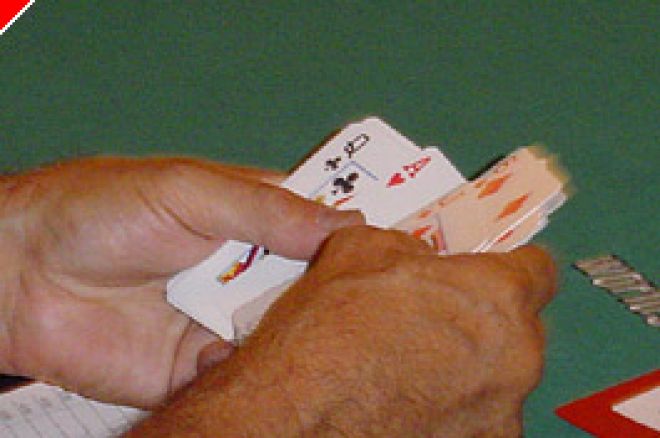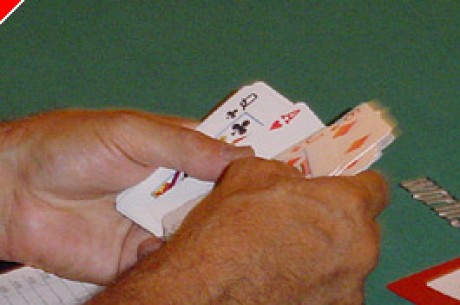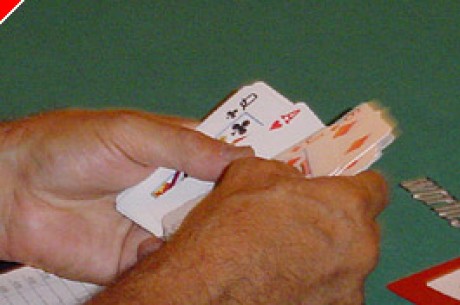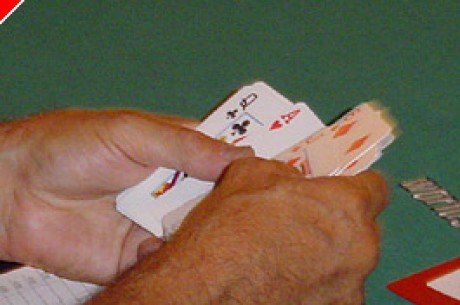Stud Poker Strategy - Playing in a New Game, Part Two

You've arrived at the home poker game you've never been to before. Don't arrive empty handed. And don't arrive late. If you can go with the person who invited you, all the better. You won't screw up the directions and you'll be less obvious when you arrive. Offer to pick him up.
If the game turns out to be a cherry patch, you'll want to make sure that you're welcomed back with open arms. And, since you may walk away with other people's money, a lot of getting invited back is appearing to be a really nice guy at the game.
So spring for a six pack of beer and some munchies. It doesn't matter if someone always is designated as bringing food to the game. It doesn't matter if there's a rake and the host provides everything. Go the extra mile and look generous. It's true that no one will notice if you bring nothing to the game. But they will remember well and fondly if you bring something. So be a sport.
Ask as few questions as possible. Pay attention to the routine and see what you can pick up. They'll clue you in if you make a mistake. Take their correction with good humor and a smile. You're entitled to not know the rules when you first start out in a new game. You don't have to be perfect. Don't get defensive or argumentative about it.
Humor and laughter go a long way in every home game I've ever been to. Be self deprecating to a fault. Make a joke out of your own ineptitude or idiosyncrasies. If you're the only guy not drinking at the game, and someone points it out, make a joke out of it. If you forget some twist that this home game has, laugh about how forgetful you are. You want to be liked.
Listen to other people's stories. Chances are they've told them so many times to the regulars in the game that you'll be the only one who isn't sick of hearing them. Be a good listener.
Don't hurry people to play. That's for the regulars to do if they think the game is moving too slowly. But you play quickly. There are few things more annoying than someone who acts slowly when it is his turn. I can tell you personally that I stopped inviting a guy to my game because he played so damn slowly. I couldn't stand it. He's a super nice guy. I just can't stand waiting for him to deliberate, hem and haw, before he finally moves. Who wants that?
Follow the action and act quickly when it's your turn. Do your best to remember the rules and idiosyncrasies of their games. It is annoying as hell to have someone always ask, "So it's TWO chips for both?" or "you HAVE to discard one before the replace?" Follow the damn rules and shut up!
You don't want to get into any arguments or disagreements if you can help it. It's tempting for experienced players to attempt to show other players the error of their ways. They don't allow check raising? We want to explain to them why that is a mistake. They have each player ante every hand instead of having the dealer ante for the table? We want to set them straight. They burn incorrectly or not at all? They use only one deck? They don't draw for seats? We know better and we want to help them make their game better.
Resist the temptation to do this. Once again, follow the damn rules and shut up. Let them play their game their way without any advice from you. If you're such a great poker player one of two things will happen. Either they'll ask for your suggestions - knowing that you are the great poker poobah you are. Or you'll figure out a way to exploit whatever rules they have.
It's hard not to speak up about a heavy rake or time charge. But follow the basic rule of shutting up even on this point. Frankly, it doesn't matter what you think of the rake. If they take $15 out every hand and the pot is $25 then that's what they do. If they're all putting up with it then the objection of some new guy isn't going to change things. The only exception to this is if the game itself is brand new - like in a brand new poker club. In that situation scream bloody murder and tell the operator you won't be back if he doesn't lessen the charge. I've seen this work. A few years ago a guy was starting up a home game/poker club. Five of us showed up. He didn't play, just dealt and collected the "juice". His girl friend shuffled before every hand.
It was a $3/6 hold 'em game and he wanted $1 before the flop and $1 after the flop if the pot got to $10 or more. Seemed reasonable to the other players. But after a couple of hands with a $2.00 rake, with only five of us tight players playing and his girl friend shuffling the cards for speedy dealing it became clear to me that he'd be dealing 60 hands an hour. That would be $120/hour from the five of us. For the eight hours we planned it would have been $960. We'd each be paying nearly $200 for a night of poker for a lousy $3/6 game in a guy's apartment. I told him to cut the rake to $1/pot if and only if there was a flop. He sheepishly agreed when I did the math for him and everyone else at the table..
A home game "operator" needs your business. So it makes sense to convince him to cut the rake. But in a home game that you've been invited to, that's a totally different story. They all put up with the rake. Your negative opinion doesn't matter. Don't come back if you don't like it. But don't complain. No one likes a whiner.
Be generous to a fault when it comes to discretionary rulings. If, for example, there's a split pot with an extra chip, always offer it to your opponent. Don't worry about the casino rules about how the chip is awarded. Toss it to your opponent. Of course, if the dealer announces a house rule about how it's awarded and flips it to you, don't look like Mother Theresa and say that you refuse it. But if there's any confusion, be the gracious guest not the tight, contentious stranger.
All this being said, I'm not suggesting that you avoid advantages that you can invisibly acquire. So, if you come late to the game and have your choice of seats, knowing nothing about the players, sit as close to the left arm of the player with the largest stack. He's likely to be either the toughest player (having won the money the old fashioned way) or the loosest player - starting and playing with the largest stack because he runs through it quickly. Either way, it's to your advantage to be acting right after him. Sure, you might have guessed wrong. He may be super tight and easy to read. But you're playing the percentages. And from my experience it's best to start to the left of the stack.
The following borders on shady, but I recommend it anyway. If there's a window sit facing it. You're not looking to cheat by setting up a reflecting device or shiner, but if one is offered to you, why have it expose your cards to the table? Have it expose their cards to you.
If there's a bathroom or bar that opens off of the room you're playing in, sit as far away from it as possible, all other things being equal. No need to invite people to walk past you all night long when you're playing your hand. Not that they'd sneak a peak - but why give them the temptation to take advantage of the new guy.
When the host asks you what you want to buy in for, assuming there's discretion in this matter, look around at what others have and buy a middling stack. Don't draw attention to yourself by either buying as short as possible or as big as possible. Don't ask, for example, "what's the minimum buy-in" or "how much can I buy in for"? Be average; be temperate; be as inconspicuous with your money as possible.
Some of this will be obvious, but let me mention it for completeness. If the game is dealer's choice, don't call some crazy ass game that no one has called. Yeah, I know it's tempting to call your favorite game where you have an edge because you've played it many more times than anyone else. But you're inviting hostility by doing this. Sure, if the game is one you've been playing in for a while and other players sometimes call these kinds of games, go ahead and do what you want. But when you're new to a game "do like the Romans". If they're all calling flop games you do the same - at least initially.
During the game, play your best. Don't worry about winning too much or being too aggressive. I'm not saying you should adopt a hard nosed, tough demeanor. Be your friendly self. But raise as aggressively as you want when you have the best hand. Bluff, slowplay, check-raise, and do everything else that gives you an advantage when it comes to the action at the table. Poker is a game about money after all. If anyone at the table is uncomfortable about that, well then they are the ones with the problem, not you. And if they decide that in spite of your impeccable politeness and generous nature that they don't want to invite you back because you're just too damn good, well then that's something you'll have to live with.
At the end of the night, when everyone is cashing out, you be the generous guy who volunteers to leave the extra buck or two in odd chips to the house - even if there was a rake. Why not? It's only a couple of bucks and you'll enhance your image among everyone there. So what if they think you're a bit of a sucker? If you're the good player you think you are, the "tip" will more than be made up in winning sessions in the future. And I'm not just talking about at the game you're leaving. Other players in the game know of other games. If they see you as a friendly, easygoing, generous sort of a player they're more likely to invite you to their game.
I do discourage one type of generous, welcoming behavior. Don't lend money to anyone you really don't know well. You can take their checks for your winnings - if that's the custom. That's fine. But if someone says that they'll pay you back at the next session you must laugh them off. I mean that literally. Make some kind of a joke, no matter how lame, about turning them down. If they're persistent then it will be obvious that they're the jerk. If you can't think of anything to say then say with a smile that you're sorry but your Daddy told you not even to lend money to him at a poker game. Say something like that, laugh, smile, and either they'll get the message or you'll be off the hook because everyone else will agree with you.
Finally, thank the host and the person who invited you. If you lost don't whine - but find a way to make sure that people notice that you lost. If you won, try to do so graciously if you can't get away with doing it silently or invisibly. Minimize your winnings to others - but don't lie because they may know anyway. Make sure you leave your phone number and email so that they can contact you about their next game. If you've met anyone at the game who also has a game, make sure to exchange numbers. Don't appear too serious about all of this or people might get nervous. Just be casual, friendly, and easy going.
When the game is done and you're back home, think about whether you want to return. There are no rules about this. Only you know whether the game was worth your time and energy. But if you decide not to play again, don't be rude or inconsiderate about how you decline. There's no point in leaving a bad impression with fellow poker players. Don't insult them by saying that the game was too low to be worth your time. Don't say anything negative about them or their game like you didn't like the players or the food or the setting or the rules.
At worst you can say something about things that no one will take personally. You could say, for example, that the game was really too long a drive for you to make most nights. You could say that you are really sensitive to cigarette smoke and don't think you can take it another night. Or you can beg out for self deprecating reasons like, "You guys are just too good" - but make sure that you don't look like you're being sarcastic.
Ed Note: All sarcasm aside. Sign up at Paradise Poker today.








